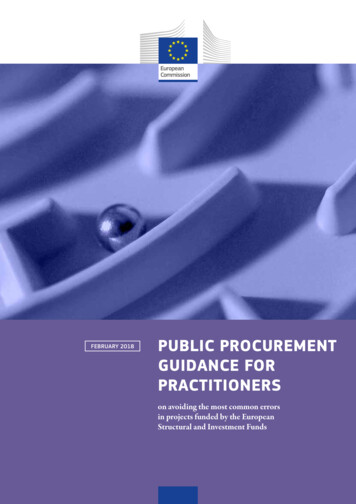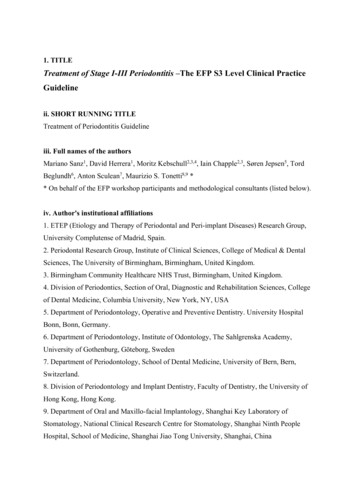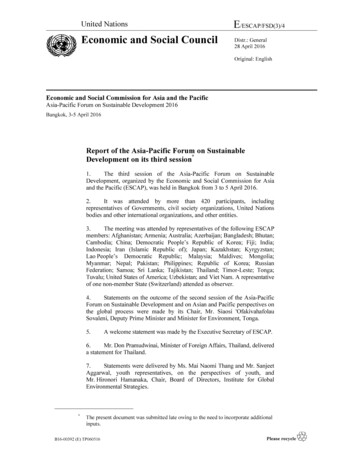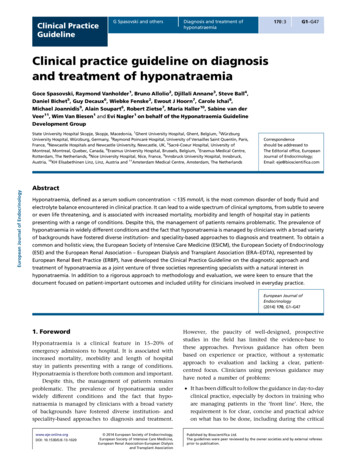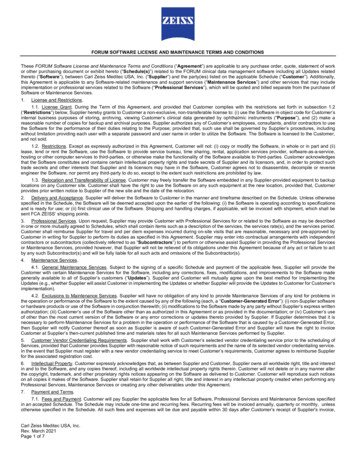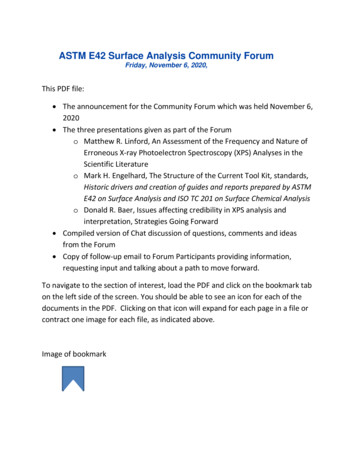
Transcription
The European Management Forum - A Non-State Actor and theEuropean CommunityClaudia HiepelAt the invitation of Swiss-German Corporate Policy Professor KlausSchwab, several hundred top managers, members of the EU Commissionand economists gathered in January 1971 in the small, remote, sophisticatedSwiss skiing resort of Davos, for a fourteen-day meeting. The purpose of theevent was to acquaint European economic players with modem Americaneconomic methods and to develop new company strategies for Europe. ThisEuropean Management Symposium heralded the start of a series of yearlymeetings and the formation of a charitable trust fund which first went by thename of the European Management Forum (EMF) and continued, from 1987onwards, as the World Economic Forum (WEF). Today, the WEF and themeetings in Davos are considered one of the most prestigious, albeit con troversial, platforms of global elites in the world of economics and politics.At the meeting in January 2012, 2 600 delegates came together under theubiquitous and watchful eye of the mass media; among these delegates 40government leaders alone were to gather under the motto "The Great Trans formation - Shaping New Models" and to reflect on the best ways of dealingwith global problems.1From modest beginnings in 1971, the meeting in Davos has now de veloped into an outstanding major event. The value of its importance rangesfrom being ranked hugely influential in creating a standardised view ofmodem capitalism or it is trivialised and called nothing more than one bigcocktail party producing barely tangible results.2 In the last decade it hasincreasingly been in the focus of a growing movement critical of globalisa-1 Hannes Koch, "Kapitalismus renovieren. Weltwirtschaftsforum von Davos" in DieTageszeitung, 24.1.2012.2 The first view held by globalisation critic Ignacio Ramonet, the second view by thephilantropist and hedgefonds manager Georges Soros, both mentioned in: JeanChristophe Graz, "How Powerful are Transnational Elite Clubs? The Social Myth ofthe World Economic Forum" in New Political Economy,8,3,2003, pp. 321-340, here:p. 321.343
Claudia Hiepeltioıı whilst involving less militant representatives of this movement withinits ranks.3Two opposed narratives can be distinguished which American politicalscientist Geoffrey Allen Pigman describes by the metaphor of "Shar-Pei"and the "wolf in sheep's clothing". Just as the Chinese folding dog developsout of a little puppy with an excess of folds and fur into a well-proportioned,fully grown dog, the EMF/WEF has made a step-by-step development to wards being an influential, transnational organisation.4 "Committed to im prove the state of the world" - this has been the immodest, official mottosince 1987. In this context, the WEF is committed to concentrating powerfrom all nations in a globalised world in order to benefit everybody.5The second narrative describes the WEF as a "wolf in sheep's clothing",as it seems to hide, behind its do-gooder rhetoric, an attitude which concealsthe desire to promote the interests of transnational companies and leadingindustrial nations and push through their version of global capitalism at theexpense of environmental and social standards.6 For these reasons, a pejo ratively tinged expression such as the "Davos man" was used for people who"have little need for national loyalty, view national boundaries as obstaclesthat thankfully are vanishing, and see national governments as residues fromthe past whose only useful function is to facilitate the élite's global opera tions."7 The British historian Timothy Garton Ash perceived a "dominantculture of Davos [that] remains that of white western man." According tohim, the Davos man is "mainly white, middle-aged and European or AngloSaxon."8 Representatives of "third-world" countries or women were not3 In January 2012, for instance, the gathering had tobe closed off by 5000 Swiss soldiersto be protected against its critics. In contrast the observations of Josef Joffe, "DreimalDavos. Das Weltwirtschaftsforum hat drei Bühnen" in Die Zeit, 27.1.2010.4 Geoffrey Allen Pigman, "A Multifunctional Case Study for Teaching InternationalPolitical Economy: The World Economic Forum as Shar-pei or Wolf in Sheep'sClothing?" in International Studies Perspectives, 2, 2002, pp. 291-309, here: p. 294.5 On the history of the WEF from the beginnings to date, historical research can onlydraw on the official history of the forum that is based on the analysis of internaldocuments: The World Economic Forum. A Partner in Shaping History. The First 40Years, Colgny/Geneva 2009.6 On the opponents and their organisational forms see Geoffrey Allen Pigman, TheWorld Economic Forum. A multi-stakeholder approach to global governance, NewYork: Routledge, 2007, pp. 123ff.7 Samuel Huntington, "Dead Souls: The Denationalization of the American Elite" inThe National Interest, 75, 2004, pp. 5-18.8 Timothy Garton Ash, "Davos man's death wish" in The Guardian, 3.2.2005.344
The European Management Forum - A Non-State Actor and the European Communitymuch more than accessories. For American sociologist Richard Sennet, the"homo davosiensis" represents an archetype of modem managerial elites, acore group of about 1 000 globally acting high achievers.9The WEF is therefore in the focus of a broad societal debate on the prob lems of global capitalism and its effects on European societies. But howreally important is this elusive organisation in this discourse and in the pro cess of globalisation itself? As (according to its own statements) an inde pendent non-profit organisation which finances itself through the donationsof its members and large multinational concerns, it carries out "high-levelnetworking" in the world of economics, politics and amongst players in civilsociety.10 It defines itself as an interface between such diverse players, inorder to make possible and help to develop a broad global discourse. Wecannot deny the fact that this fomm must have a considerable influence onmatters, but where exactly this influence comes into play and how we canmeasure it in concrete terms is far more difficult to ascertain precisely.It is indeed in the nature of things that it is difficult to prove the influenceof networks on political decision-making. There are two reasons for this:firstly, the confidential nature of the forums themselves and, secondly, thelack of written sources. The meeting in Davos is, of course, no longer aclandestine event; the organisers themselves are part of a broadly stagedmedia event.11 The influence of this event on the public debate can be de termined by the existence of published sources. This was not quite the casewhen the organisation was in its formative days: a wider public interest onlydeveloped in the second half of the Eighties. And even then, numerous subforums and confidential discussion groups have developed in the wingswhich further hamper chances of transparency.Although the problem of sources makes historical research on networksand semi-private organisations more difficult, they have, however, becomean important topic when relating international history. Since the transfor mation of statehood in and through Europe and on the global level since theNineties, networks and NGOs have an important role to play. "Governing"is no longer a "privilege" of state players. The European Management forum9 Richard Sennet, "The dizzy life of Davos man" in The Independent, 11.10.1998.10 The World Economic Forum. A Partner in Shaping History, p. 166. Amongst theearly members were corporations such as Royal Dutch Shell, Unilever or Philips.See also the list of "strategic partners" in 2009, ibd., p. 253.11 On the manifold activities and involvements see the website of the organisation:www.weforum.org.345
Claudia Hiepelis therefore a suitable test case for governing within a multi-level sys tem.12 European research on integration has discovered the influence of net works; initial research on comparable organisations such as the BilderbergGroup13 or the European Round Table of Industrialists14 has already beencarried out. On the other hand, the EMF/WEF has so far not been the subjectof historical research.15 This might be astonishing, as the Davos "successstory" is closely linked to Europeanisation and globalisation. They bothstarted in the Seventies, that were characterised by a rapid growth of multi national corporations and international NGOs.16 The WEF evolved mostimpressively in the 1990s and in the first decade of the 21st century, whenthe resolution of the Cold War gave way to the accelerated development ofa new world order and the victory of a liberal capitalist economic order17with which the Forum is frequently identified.12 Gary Marks/ Liesbet Hooghe/ Kermit Blank, "European Integration from the 1980s:State-Centric vs. Multi-level Governance" in Journal of Common Market Studies,34, 1996, pp. 341-378. A similar reading of the WEF as a new form of global gov ernance in Geoffrey Allen Pigman, The World Economic Forum. A multi-stakeholderapproach to global governance, New York: Routledge, 2006.13 Valérie Aubourg, "Transatlantische Geschäftsbeziehungen. Die BilderbergGruppe", in: Michael Gehler/ Wolfram Kaiser /Brigitte Leucht (eds.), Netzwerke imeuropäischen Mehrebenensystem. Von 1945 bis zur Gegenwart, Wien: Böhlau,2009, pp. 69-85.14 Maria Green Cowles, The European Round Table of Industrialists and the SingleMarket Program. From Political to Policy Network, in: ibd., pp. 139-150.15 Besides infrequent mentioning of the „Davos man" in literature, only political sci ences have dealt with the WEF more systematically yet. Rather affirmative Pigman,The World Economic Forum. A multi-stakeholder approach to global governance',hypercritical Graz, How Powerful are Transnational Elite Clubs? This Swiss polit ical scientist reports on the enormous difficulties to get access to sources and con temporary witnesses.16 Akira Iriye, Global Community. The Role of International Organizations in theMaking of the Contemporary World, Berkeley: University of California Press, 2002;idem, "Nationale Geschichte, Internationale Geschichte, Globale Geschichte", in:Manfred Berg/ Philipp Gassert (eds.), Deutschland und die USA in der Interna tionalen Geschichte des 20. Jahrhunderts. Festschrift fiir Detlev Junker, Stuttgart:Franz Steiner Verlag, 2004, pp. 21-39.17 Volker Berghahn sees a"watershed of two eras". Volker R. Berghahn, "Structuralismand biography. Some Concluding Thoughts on the Uncertainties of a Historiographical Genre", in: Idem/ Simone Lässig (eds.), Biography between Structure and Agen cy. Central European Lives in International Historiography, New York/ Oxford:Berghahn Books, 2008, pp. 234-250, here: p. 241.346
The European Management Forum - A Non-State Actor and the European CommunityOriginally, the symposia Klaus Schwab had been organising in Davossince 1971 were conceived as a European answer to the onset of globalisa tion. Even if the term "Globalisation" was not yet in regular use at the be ginning of the Seventies, the accelerated processes connected to growingtransnational interdependencies were certainly evident. Even though, inhindsight the Seventies can generally be seen as a "turning point", cominghand in hand with an increasing number of political, economic, scientific,technological, social, cultural or mental transformations18, observers at thetime realised that we were living in an epoch of upheaval without yet havingfound a term to describe it. Louis Armand, the first head of Euratom, de scribed it as an epoch of "planetisation". The new view of Earth, as well asspace research which had made the first trips to the moon possible, openedup whole new perspectives on the planet which now seemed small andunimportant and on which the drawing up of borders now seemed arbi trary.19The problems linked to planetisation at the tum from the Sixties to theSeventies were, however, far more prosaic and were popularised under theslogan of "the American challenge". This had its origins in the provocativeessay by left-wing intellectual French journalist Jean-Jacques ServanSchreiber which was published under the title "Le défi américain" and wasreprinted and translated many times in the following years. Servan-Schreibermade clear the widespread concern of the Europeans that European compa nies would be sold out to Americans, leading to an American conquest ofthe market through direct investments.20 He identified the "technologicalgap" as the cause of American domination as well as a "managerial gap"18 Robert Cox, "Globalization, Multilateralism and Democracy", in: Idem/ T. Sinclair,Approaches to World Order, Cambridge: Cambridge University Press, 1996,pp. 524-536. From a historical perspective see Madeleine Herren, InternationaleOrganisationen seit 1865. Eine Globalgeschichte der internationalen Ordnung,Darmstadt: Wissenschaftliche Buchgesellschaft, 2009, pp. 3 f., who regards global isation as a "tief in die Geschichte hineinreichende[n] Normalfall", not strictly con fined to contemporary history.19 Louis Armand, in: Jean-Jacques Servan-Schreiber, Die amerikanische Heraus forderung, Hamburg: Hoffmann und Campe, 1968, pp. 359-367.20 Jean-Jacques Servan-Schreiber, Le défi américain, Paris: Denoël, 1967. The Germantranslation appeared in 1968: Die amerikanische Herausforderung, with a forewordwritten by the Bavarian Christian Socialist party leader Franz-Josef Strauß! On thereception in Germany and France see the critique of Gerhard Stoltenberg in DerSpiegel, 11/1968, pp. 154-157 sowie Mario Levi in Politique étrangère, 33, no. 6,1968, pp. 644-647.347
Claudia Hiepelbetween Europe and the USA. The USA had not only risen to become theleading nation in the fields of future technologies such as nuclear power,electronics, space research and electronic data processing but was now lead ing the way in the application of rational management techniques and meth ods.21Klaus Schwab, who was obviously impressed by this bestseller, wantedto make his own contribution towards "bridging the management gap be tween the USA and Europe".22 If we look at the founding history of the EMF,this is primarily the product of the commitment of one single person. Bomin the Swabian town of Ravensburg in 1938, having grown up in the SwissGerman border region, Schwab had already been a champion of internationalunderstanding and Franco-German youth exchange programs during hisyouth. He obtained a Doctorate in Mechanical Engineering and EconomicSciences, studied for a year, from 1966 to 1967, at the University of Harvard(Kennedy School of Government) and also attended courses at the renownedHarvard Business School at the same time. He met numerous influentialpersonalities there who were later to become regular guests at the symposia.In 1970 he then began preparations for the first European Management Fo rum, intending "to bring European corporate managers together with theirstakeholders".23 In this context he wanted to transfer the insights he hadgained in the USA to Europe and convince European managers of the stake holder approach. In 1971 he published a short book in which he took theexample of mechanical engineering to explain the obviously unfamiliarStakeholder Theory in which successful, modem business leadership is notsupposed to be limited to the maximisation of profit but is also supposed toconsider the interests of everybody involved in the production flow and dis tribution process: this would also include, along with the owner and share holders, the customers, suppliers, the employees as well as the governments,society's interest groups and the national economies.24 The business prin ciple of multi-stakeholder participation was also transmitted to the organi 21 Servan-Schreiber, Die amerikanische Herausforderung, p. 56.22 Lange gerudert in Der Spiegel no. 4, 1988, pp. 71-74, hier: p. 74; Joachim Dorfs/Claus Larass,"'Ich sehe mich fast als Künstler. ' Der Davos-Gründer Klaus Schwab",in: Bernd Ziesemer (ed.), Pioniere der deutschen Wirtschaft. Was wir von den großenUnternehmerpersönlichkeiten lernen können, Frankfurt/ New York: Hoffmann undCampe, 2012, pp. 113-124, here: p. 115.23 The World Economic Forum. A partner in shaping history, p. 7.24 Klaus Schwab, Moderne Unternehmensfiihrımg im Maschinenbau, Frankfurt:Maschinenbau-Verlag, 1971.348
The European Management Forum - A Non-State Actor and the European Communitysation itself which was attempting to bring together stakeholders from in dustry, the European Union and its member states, trade unions and otherplaymakers from civil society.After the successful start to the inaugural meeting, Schwab decided to usethe profits he had made from the first symposium to found a non-profit trust:the European Management Forum was born. The fact that Schwab benefittedfrom contacts made in the setting up of his forum and thanks to his positionas a member of the "Centre d'Études Industrielles (CEI)" in Geneva is notmentioned in the company's official view of events. The CEI had alreadybeen set up as a Management School in 1946, where Klaus Schwab hadalready been teaching and which was one of the most influential schools ofits type. The Symposium in 1971 was a commemorative event which Schwabset up to celebrate the 25th anniversary of the CEI.25 That hardly diminishesSchwab's role as an individual protagonist, however.26From the very beginning, the EC Commission was concerned as a stake holder in planning and execution. The gap that Servan-Schreiber identifiedas an industrial gap to the USA could only be filled with the help of improvedconditions in Europe. A uniform industrial policy in the EEC did, however,not exist. The Treaties of Rome did not plan any concrete measures to thisend. Industrial policy was restricted to coordinating the economic policiesof individual member states and ensuring that competition rules were beingadhered to.27 In this respect the USA were regarded as being exemplary inthe way in which they effectively employed a policy of "cross-fertilisation",by using public funding for research and science and applying it in industrialcompanies.28 Since 1970, however, there had been a politically strong EC25 Jean-Christophe Graz, "How Powerful are Transnational Elite Clubs?" in New Po litical Economy, 8, 2003, pp. 328-330, whose observations are based on archivalsources of the CEI that can be found in the university's archive of Geneva.26 Contrary to Graz, ibid., p. 328 f. on the importance and the programme of the CEIsee: Rosemarie Fiedler-Winter, Die Management-Schulen,Düsseldorf/ Wien: EconVerlag 1973, pp. 197-200.27 Eric Bussière, "Schwierige Anfänge einer Industriepolitik" in: Die EuropäischeKommission 1958-1972. Geschichte und Erinnerung einer Institution, Luxemburg:Amt für Amtl. Veröff. der Europ. Gemeinschaften 2007, pp. 489-503; Idem, "D'uneEurope inachevée à l'affirmation du regionalism européen dans la mondialisation",in: Antonio Varsori/ Guia Migani (eds.), Europe in the International Arena duringthe 1970s. Entering a Different World, Brüssel: Peter Lang, 2011, pp. 41-54. It wasfinally the Maastricht Treaty in 1992 that modified the EC Treaty in order to providea legal basis for a common industrial policy (art. 157).28 Servan-Schreiber, Die amerikanische Herausforderung, p. 56.349
Claudia HiepelCommissioner in the form of the Italian Federalist, Altiero Spinelli, who hada particularly strong desire to shape the Community's industrial policy.29 Heenvisaged corporate ideas of industrial planning by involving all interestgroups: the European Community, the member states, trade unions and eco nomic leaders - this clearly corresponded to the concept of Klaus Schwab.He therefore had an easy job when trying to get the Commission involved.The Commission's president assured him of his support, although he at tached two conditions: firstly, the organisation they planned was to be in dependent and non-profit making and, secondly, meetings were to be heldin a country of the European Community. This clearly was not the case withDavos, which was in Switzerland.30 However, this did not prevent the Com mission from taking part in the meeting with high-ranking delegates. TheVice President of the Commission, Raymond Barre, acting as Commissionerfor both Finances and Economy, as well as Spinelli, took part in the firstmeeting and took on the patronage in the first few years."Developing a European Corporate Strategy" - this motto, as one of thefirst symposia, refers to the European focus in the early years of the Forum.The Chair was taken by the US economist George P. Baker, Dean of therenowned Harvard Business School. John Kenneth Galbraith, liberal USeconomist and consultant for a number of Democratic Presidents, acted asa Keynote Speaker. Hermann Kahn, on the other hand, a highly controversialfigure of American Conservatism, a frequent consultant in various conser vative Think Tanks, was also present. A broad spectrum of opinions was tobe represented and this was to be, according to the wishes of the initiators,a key characteristic of the Forum and back up the myth of the "Davos Spirit":the climate should be one of unprejudiced intellectual exchange based onvastly differing opinions and should encourage the cross-fertilisation of29 Sigfrido M. Ramirez Pérez, "Transnational business networks propagating EC in dustrial policy: The role of the Committee of Common Market Automobile Con structors", in: Wolfram Kaiser/ Brigitte Leucht/ Morten Rasmussen (eds.), The His tory of the European Union. Origins of a trans- and supranational polity 1950-72,New York: Routledge, 2009, pp. 74-92, here: p. 78. DG III for industrial policy hadnot been installed before 1967. On the industrial policy after Spinelli's withdrawalin 1976 see Arthe van Laer, "Quelle politique industrielle pour l'Europe? Les projetsdes Commissions Jenkins et Thorn (1977-1984)", in: Milieux économiques etintégration européenne au XXe siècle. La relance des années quatre-vingt (19791982), Paris, 2007, pp. 7-52.30 The World Economie Forum. Partner in Shaping History, p. 13 ff.350
The European Management Forum - A Non-State Actor and the European Communityideas.31 A broad range of topics was developed which moved away from,strictly speaking, management topics and more towards larger debates onsociety and topical problems. In addition, the American model was rapidlylosing esteem. Being ahead in the technical and entrepreneurial sense hadnot prevented the American trade deficit and the fall of the Dollar, whichhad brought about a currency crisis and a monetary paradigm shift.32 TheEMF reacted immediately, by making the currency crisis and possible so lutions a subject at the European level in 1972 under the leadership of thehead of the Deutsche Bank, Hermann Josef Abs. The Prime Minister ofLuxembourg, Pierre Werner, presented the results of a working group namedafter and led by him and set up by the Council of Ministers to develop a planby stages to create an economic and currency union. The setting up of acommon European economic and currency union was regarded by partici pants as a pre-condition for effective trade; the idea of extending EU mem bership to include Great Britain, Ireland, Denmark and Norway in this Euro pean economic area was also welcomed.In 1973, together with Aurelio Pecci, the co-founder and President of theClub of Rome, the recently published study entitled "The limits to growth"on the future of the world economy was discussed.33 Influenced by thegloomy prognoses proffered in the report, the participants of the Forum de cided on a code of ethics, the so-called Davos Manifesto, in which the ideawas put forward that the profitability of a company should be linked to moraland ethical standards in business. Based on the stakeholder approach, re sponsible company management aims to serve customers, investors and em ployees equally and, bearing in mind what the Davos meeting had just haveheard, to use resources sparingly: "The management has to serve society. Itmust assume the role of a trustee of the material universe for future gener ations." The payment of "appropriate taxes" was an obligation of companies,31 Ibid., p. 7.32 The decision of US president Richard Nixon in august 1971 to unilaterally termi nating the convertibility of the dollar into gold was the beginning of the end of theinternational currency system of Bretton Woods, Harold James, Rambouillet,15. November 1975. Die Globalisierung der Wirtschaft, München: DTV, 1997,pp. 13 Iff.33 Donella H. Meadows et. al, The Limits to Growth. A report for the Club of Rome'sproject on the predicament of mankind, New York: Universe Books, 1972.351
Claudia Hiepelso that state and society can finance the tasks they have to provide.34 The"Davos man" at this time had the reputation of being an upholder of moralstandards rather than being an irresponsible global player.35A further remit of the Forum was to invite high-profile critics of the cur rent economic and social order. There was a wide range of people involved,such as the French environmental protectionist, Jacques Cousteau (1973),who had become famous as a result of his TV documentaries, the theologian,Dom Helder Camara, in the following year, environmental campaigners likeRalph Nader in 1976 or the German peace campaigner and co-founder ofthe German Green Party, Petra Kelly, in 1982.36Just as the meetings in Davos were a springboard for the mission statementof the EMF, informal discussions then took place in different forums, roundtable talks and meetings. As early as 1973 two series of round table talkswere set up, one of them in Brussels between the European business repre sentatives and the Commission, and one in Bonn to discuss German indus trial policy. These talks were gradually extended and introduced in furtherEuropean Countries.37 In 1982 the IGWEL (Informal Gathering of WorldEconomic Leaders) was established as an informal circle of leading businessand politics representatives which made "off the record" conversations pos sible. Clearly, such round tables and informal conversations were a goodopportunity for people to get together with different conversation partnersin unusual constellations outside the usual business and political circleswithout the pressure of having to produce concrete results. At the same timethere was the criticism that precisely these types of forums lacked trans parency and democratic legitimacy. It is very difficult to ascertain whichresults were obtained through these meetings. The idea resulting in NAFTA,34 "Code of Ethics - The Davos Manifesto", in: Rosemarie Fiedler-Winter, Die Moralder Manager, Stuttgart: Seewald Verlag, 1977; also published in The World Eco nomic Forum. Partner in Shaping History, p. 16.35 Rosemarie Fiedler-Winter, "Die Moralapostel von Davos. Für die Führungskräfteder Wirtschaft wird ein Verhaltenskodex entwickelt" in Die Zeit, 26.4.1974.36 All examples in The World Economic Foram. Partner in Shaping Histoty.37 Ibid., p. 17.352
The European Management Forum - A Non-State Actor and the European Communitythe North American Free Trade Arrangement, was supposed to have beenbom there.38The EMF very soon left the concept regarding Europe and Transatlantictransfer of ideas behind. It reached out its feelers in the economic areas out side Europe shortly after its formation. In 1976 Arab and European economicrepresentatives came together on the initiative of the EMF in Montreux, toform an Arab-European Business Co-operation Symposium in an attempt torelax tension in the relationship between the Arab world and the Westernindustrial nations after the oil crisis of 1973/74. In 1979 Schwab was alsofascinated by the new course in China as laid down by the new Chineseleader, Deng Xiao Ping, and also sent out an invitation to him; of course hedid not appear personally but at least sent a delegation to Davos.39 Finally,the historic meeting in 1986 between the Greek and Turkish Prime Ministers,Andreas Papandreou and Turgut Özal, needs to be mentioned, as they man aged to make a shake-hands appearance on a panel in Davos. This did notmean that the problem of Cyprus had been solved, but a contribution to animprovement in the climate between the two states had been made. At thesame meeting in 1986, just before the fall of the Iron Curtain, the SovietPrime Minister, Nikola Ryzhkov, was represented via satellite.40During the 1970s the Davos European Management Forum had firmlybeen established as a non-governmental organisation. The attendance in creased to about 900 participants, among them the leaders of large Europeancompanies such as Royal Dutch Shell, Unilever or Philips. First official co operations with other international organisations, the UNIDO (United Na tions Industrial Development Organisation) for instance, were established.Soon the OECD joined as official sponsor and host of some of the roundtables that were established in European capitals and by the Commission inBrussels to create national fora under the EMF organisational umbrella. TheDavos meetings were generally characterised by a politicisation concerningthe issues as well as the invited guest speakers. High-ranking political leaders38 Ibid., p. 56. According to that, in 1984 on the part of the EC there were presentRaymond Barre, Piet Dankert (EC parliament's president) and Leslie Fielding (DGfor external relations), also the President of the Worldbank, GATT representatives,the Secretary General of the OECD, German Minister of Economics Graf Lambs dorff, members of the governments of Brazil, Malaysia, Australia, Zimbabwe andthe Director General of the ILO. The role and presence of corporate managers is notmentioned here.39 The World Economic Forum. A Partner in Shaping History, p. 29ff.40 Ibid., pp. 63-70.353
Claudia Hiepelwere now regularly invited, beginning with Valéry Giscard d'Estaing,Helmut Schmidt or opposition leaders and potential futur
The European Management Forum - A Non-State Actor and the European Community Claudia Hiepel At the invitation of Swiss-German Corporate Policy Professor Klaus Schwab, several hundred top managers, members of the EU Commission and economists gathered in January 1971 in the small, remote, sophisticated Swiss skiing resort of Davos, for a fourteen .




